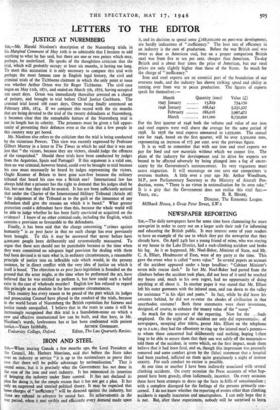LETTERS TO THE EDITOR
JUSTICE AT NUREMBERG
Stn,—Mr. Harold Nicolson's description of the Nuremberg trials in his Marginal Comment of May loth is so admirable that I hesitate to add anything to what he has said, but there are one or two points which may, perhaps, be underlined. He speaks of the thoughtless criticism that the trial, which will probably occupy at least six months, is lasting too long. To meet this accusation it is only necessary to compare this trial with perhaps the most famous case in English legal history, the civil and criminal trials of the Tichborne claimant in which the only point at issue was whether Arthur Orton was Sir Roger Tichborne. The civil case began on May nth, 18'71, and ended on March 5th, 1872, having occupied 102 court days. Orton was immediately thereafter arrested on a charge of perjury, and brought to trial before Chief Justice Cockburn. The criminal trial lasted 188 court days, Orton being finally sentenced on February 28th, 1874. If we compare this record with the six months that are being devoted to the trial of the twenty defendants at Nuremberg, it becomes clear that the remarkable feature of the Nuremberg trial is not its length but its celerity. The prisoners must be given a full oppor- tunity of presenting their defences even at the risk that a few people in this country may get bored.
Mr. Nicolson also refers to the criticism that the trial is being conducted by the victorious Powers. This view was recently expressed by Professor Gilbert Murray in a letter to The Times in which he said that it was not just that " the victors, because they are victors, should judge the offences of the vanquished." Should these trials have been conducted by judges from the Argentine, Spain and Portugal? If this argument is a valid one, then no war criminal, however brutal, could ever be brought to trial because his case must necessarily be heard by judges representing the victors. Ought Kramer of Belsen to have gone scot-free because the military tribunal that heard his case was a British one? International law has always held that a prisoner has the right to demand that his judges shall be fair, but not that they shall be neutral. It has not been sufficiently noticed that under the Charter of the International Military Tribunal (Article 26) " the judgement of the Tribunal as to the guilt or the innocence of any defendant shall give the reasons on which it is based." What greater protection could a defendant have than this, because the whole world will be able to judge whether he has been fairly convicted or acquitted on the evidence? I know of no other criminal code, including the English, which contains a provision so favourable to the defendants.
Finally, it has been said that the charge concerning " crimes against humanity" is ex post facto in that no such charge has ever previously been brought. To this it may be answered that never before have 4,0430,000 people been deliberately and systematically massacred. To argue that these acts should not be punishable because at the time when they were committed no adequate legal provision for dealing with them had been devised is to turn what is, in ordinary circumstances, a reasonable principle of justice into an inflexible rule which would, in the present instance, be in direct conflict with the very idea of justice on which it itself is based. The objection to ex post facto legislation is founded on the ground that the actor might, at the time when he performed the act, have believed that he was entitled to perform it, but how could such a belief exist in the case of wholesale murder? English law has refused to regard this principle as an absolute in far less extreme circumstances.
This country has every reason to be proud of the part which its judges and prosecuting Counsel have played in the conduct of the trials,•because in the world forum of Nuremberg the British reputation for fairness and justice stands unequalled. I believe that in the years to come it will be increasingly recognised that this trial is a foundation-stone on which a new and effective international law can be built, and that here, in Mr. Nicolson's words, lawlessness has at last been confronted with patient
University College, Oxford. Editor, The Law Quarterly Review.






























 Previous page
Previous page